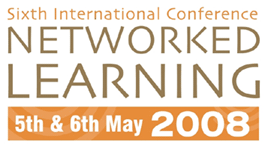

Facilitating Communities of Practice in Teacher Professional Development
Mayela Coto
Universidad Nacional, Costa Rica; e-Learning Lab, Aalborg University,
Denmark, mayelacoto@hum.aau.dk
Lone Dirckinck-Holmfeld
e-Learning Lab, Aalborg University, Denmark,
lone@hum.aau.dk
Abstract
In this paper, we describe a project for teacher professional development addressing the introduction of information and communication technology and problem and project-based approaches into teaching and learning in the Universidad Nacional, Costa Rica (UNA). The project supports the argument that learning as part of a community of practice can provide a powerful and useful model for teacher professional development and that problem oriented project pedagogy and information and communication technology can be used to shift from a model based on delivery of information towards a pedagogy favouring learning as knowledge construction through collaboration, projects and problem orientation.
The research is informed by a socio cultural perspective on human learning and development, where learning is regarded as a social process. It draws on the relation between the concepts of communities of practice, information and communication technology, problem oriented project pedagogy and teacher professional development. Our interest is to analyze what are the conditions to nurture a change oriented community of practice in order to transform teacher’s practice, using technology and problem oriented project based pedagogy as means to foster the change. We are designing a learning community with teachers from several campus of the university. This learning community is the first step to cultivate the desired community of practice.
The learning environment is being designed as a framework for flexible and blended learning, regarding teachers as the main agents of their professional development, supported by an environment rich in challenges and interactions around the philosophy and methodologies of problem and project based learning. Design-based research is the methodology chosen to help us in the process of understanding the conditions that can affect the emergence of a community of practice within the learning community, and what kind of scaffolding is necessary to sustain it. The whole process is established in three main phases: designing for change, experiencing the change and understanding the change; in each of these, specific design, facilitation, and support strategies are being planned to help grow and sustain the community.
According with our goals to contribute to the process of transforming teaching practice and to foster a culture of problem orientation, projects, collaborative learning and sharing knowledge, the design proposed in this paper includes fostering relationships between teacher participants, exploration of a domain of knowledge in which participants share an interest, and development of innovative practices that support change and further learning. The project envisions that teacher participants will form a self-sustaining community of practice within which they will improve their pedagogical and technological knowledge through connecting and learning from each other, through discussing common problems and issues, sharing good practices and collaborating on projects. The project will further more provide insights into the conditions to cultivate a community of practice, the social dynamics of the community, the technology as a learning and knowledge sharing infrastructure, and the organizational support of UNA.
| About NLC |
2008 Conference Papers
| Conference Committee| Keynote
Speakers
| Papers from previous NL conferences |Research Seminars| Current Conference
| Sponsors | Contact
|
